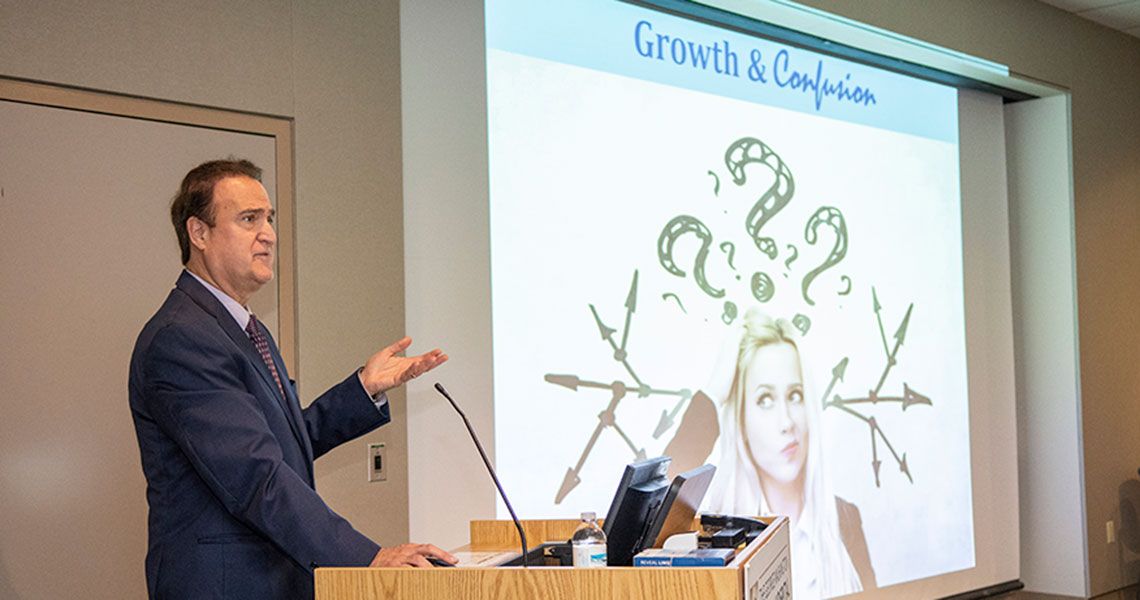It’s a case of “therapy wars,” began Robert E. Feinstein, MD, professor of psychiatry and associate chair of education at the University of Texas at Austin Dell Medical School. His colleagues, to Feinstein’s frustration, were constantly bickering over which psychotherapy approach was best, and residents were overwhelmed with the myriad treatment models.
“I think, from ‘Alice in Wonderland,’ the Dodo bird was correct: everyone has won, and all should have prizes,” he said. “That’s my philosophy. … About 75 percent of all forms of psychotherapies are equally effective.”
The issue, he explained during the 37th Annual Daniel S. Prager, MD, Lecture in Psychoanalytic Psychiatry at the George Washington University School of Medicine and Health Sciences, is matching a patient to a disorder or problem at the appropriate time.
“That means that in the current environment, you’ll have a patient who you might start treating with CBT [cognitive-behavioral therapy] and then get resolution of their symptoms,” Feinstein said. “Then they’ll come back a year later with problems in their marriage, and you might treat them with family therapy. And they might come back a year later with parent-child problems, so you work in that sphere.”
Within the world of treatments, he continued, there are certain factors that impact the effectiveness of treatment, regardless of which method a psychiatrist prefers. Take, for example, the Hawthorne effect. In the early 20th century, researchers studied factory workers’ productivity while altering sensory factors, such as lighting. As a result of the lighting changes – and the associated attention – workers became more productive. “People get better when they know they’re being observed,” Feinstein said.
When patients know they’re going to be watched, they adjust their behaviors. Similarly, when patients know they’re going to see a therapist, their hope and positive expectations grow, and many find themselves feeling better before the first session, he added. In World War I, for instance, a military surgeon would tell soldiers ‘You will recover.’
“Just by telling them ‘You will get better,’ and treating them in the environment where they were injured, [they] had a much better outcome,” Feinstein said. “I think it’s really important when we’re working with patients to say to every patient, ‘You can get better.’ There is no patient you can’t help; you just have to define what ‘help’ means.”
Other factors can help determine the effectiveness of therapy, regardless of the school of thought: patient readiness, an emphasis on patient strengths, mentalization, empathy, genuineness, and emotional intelligence. Psychiatrists, Feinstein added, need to be attentive to patients’ mental states, while also being cognizant of their own reactions.
With empathy, for example, therapists may be concordant, or feel similar empathy with their patient, or complementary, feeling the opposite of their patient. Using those feelings to shape treatment methods can enhance the therapy’s effectiveness.
Additionally, psychiatrists need to be aware of extra-therapeutic events, which can have a significant impact on patient outcomes. Death and dying, health care, criminal justice, finances, and family-related issues can all impact a patient’s wellbeing – as can positive events, such as getting married or buying a first home.
In all, Feinstein concluded, as long as psychiatrists work to pair the right method with the right patient at the right time, while keeping a check on their own reactions to patients and any external events, outcomes are likely to be encouraging – and “therapy wars” can end in peace.



